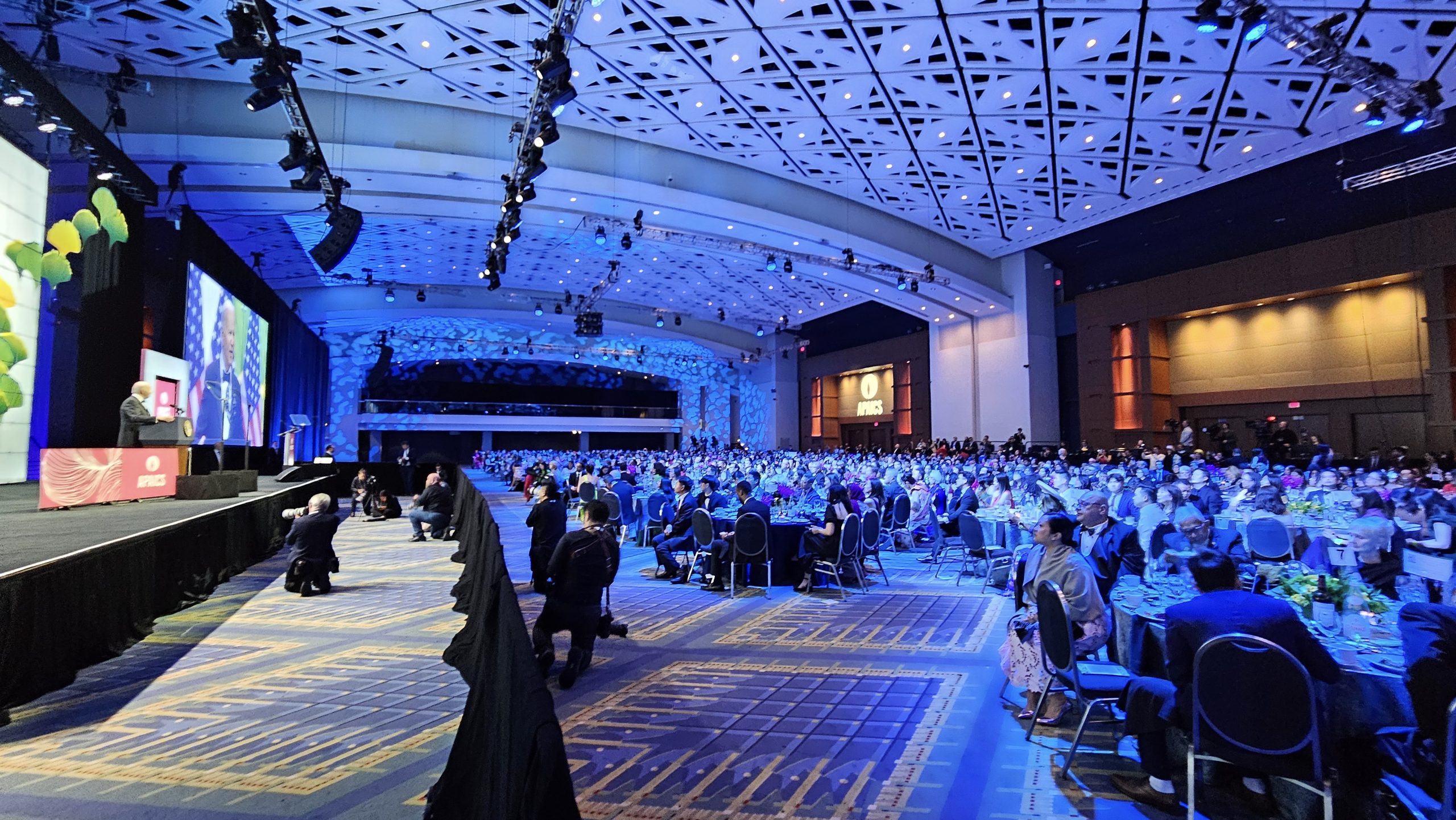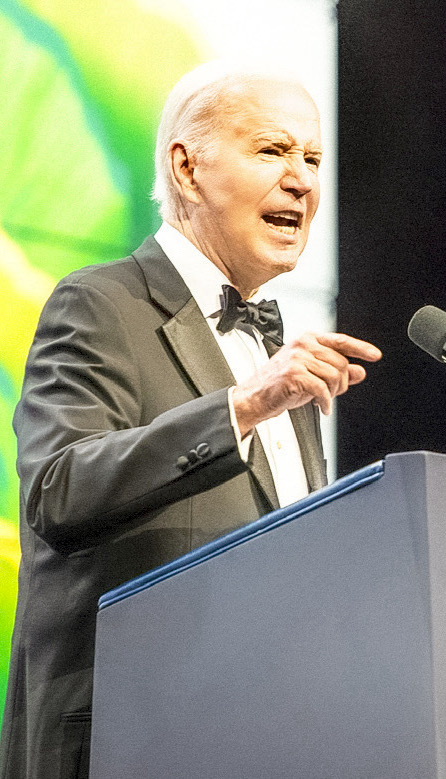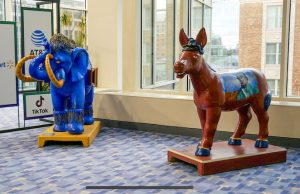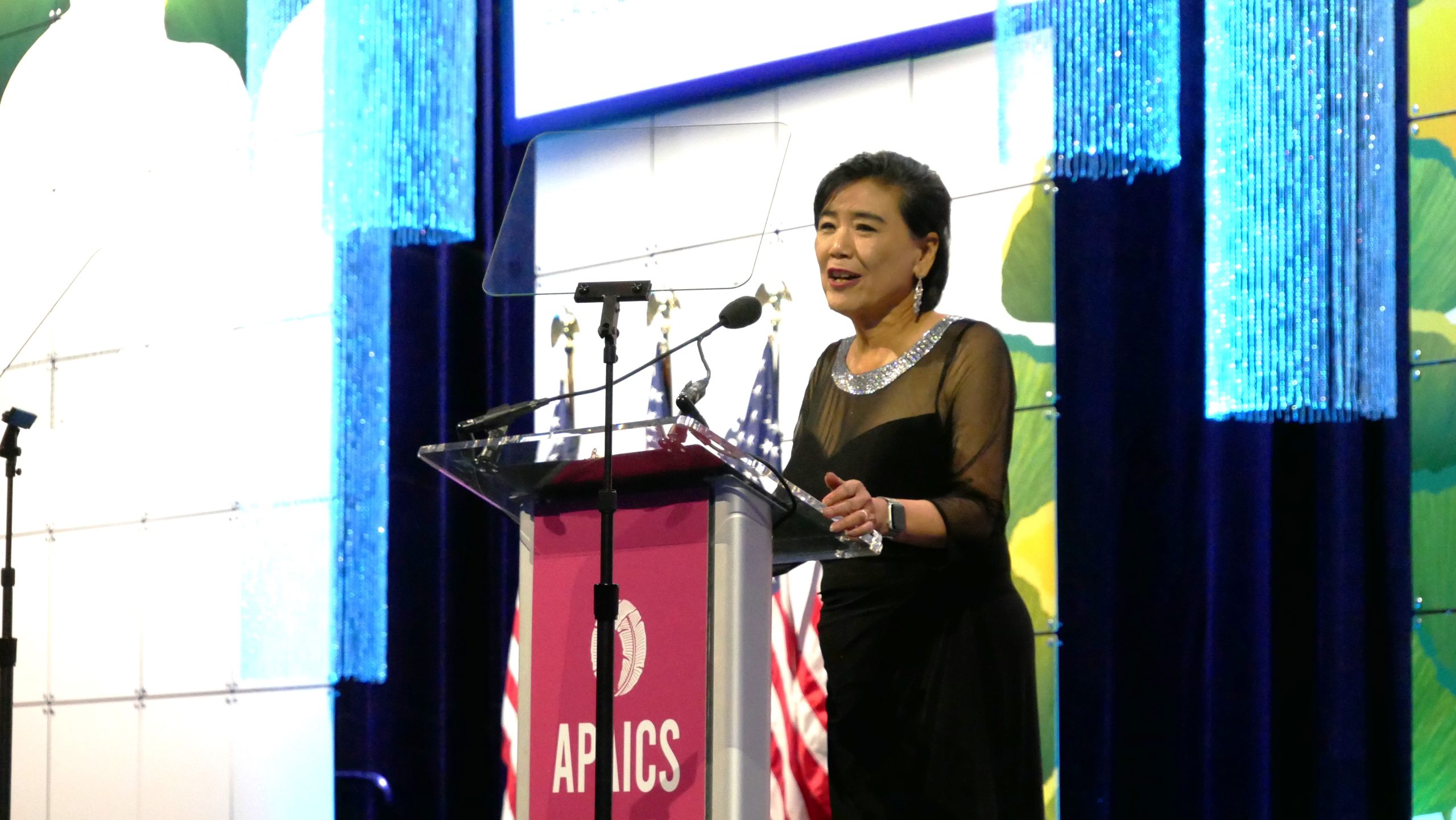
The audience listens to President Biden’s speech at APAICS’ 30th anniversary gala held May 14 at the Walter E. Washington Convention Center. (Photo: Gil Asakawa)
POTUS name checks Mineta as APAICS celebrates its 30th anniversary.
By Gil Asakawa, P.C. Contributor
WASHINGTON — Prom is a springtime ritual, and “Asian Prom” lives up to the pomp and prestige of the traditional school-sponsored event.

President Joe Biden makes a point during his speech at the APAICS 30th anniversary gala on May 14. (Photo: Kaz Sasahara and APAICS)
Except Asian Prom isn’t a dance. It’s an award ceremony and celebration of Asian American Native Hawaiian and Pacific Islander excellence in culture, policy and social justice. And this prom is sponsored by the Asian Pacific American Institute for Congressional Studies, which marked its 30th anniversary on May 14 in Washington, D.C., with a host of notable speakers, including President Joe Biden.
APAICS and its sister organization, the Congressional Asian Pacific American Caucus, were formed the same year, 1994, by Robert Underwood, the congressional delegate from Guam, and the late-California Democrat Norman Mineta, who represented California in Congress and served in the cabinet of two presidents, including as Secretary of Transportation during the 9/11 attacks. Mineta’s name was invoked often during the gala, which was held at the Walter E. Washington Convention Center.
CAPAC was formed to ensure that AANHPI lawmakers can advocate for the well-being of Asian American Native Hawaiian and Pacific Islanders in legislation and policy. APAICS was founded in order to support CAPAC as a resource to Congress and promote politically active and civically engaged AANHPIs. The annual Awards Gala was started alongside both organizations as a way to promote that unity in the community. Hence, the Asian Prom.
Like a typical prom, Asian Prom attendees were dressed to impress. But unlike the high school dance, this event was about celebrating AANHPI accomplishments with awards, and the dress code, instead of tuxes and dresses, welcomed “black tie or cultural attire.” There were plenty of both.
At a reception before the start of the dinner ceremony, hundreds milled around outside of the banquet ballroom, displaying a fashion mix — formal dresses of varying lengths and tuxedoes topped with neat bow ties but also sari, kimono and traditional Chinese, Filipino and Vietnamese outfits. The tone of the evening was set visually as pan-Asian and pan-cultural.

The bipartisan spirit was given a tip of the hat at the 30th anniversary gala of the Asian Pacific American Institute for Congressional Studies on Tuesday, May 14 at the Walter E. Washington Convention Center in Washington, D.C. (Photo: Gil Asakawa)
The diversity of style suited the program, including the Asian-inspired meal that was served to the gala’s 1,300 attendees: a tropical salad; braised short ribs sauced with pineapple, hoisin and miso served on mashed sweet potato; and green tea cake for dessert. The only thing missing was rice.
The program celebrated the diversity of the Asian diaspora in the U.S., starting with the embrace of the evolving terminology for the community, which was once referred to as just “Asian American” and has over the decades expanded to the current AANHPI acronym, which every speaker invoked, including Biden.
Among the audience in the cavernous ballroom were leaders of AANHPI organizations such as Christine Chen of APIAVote, media stars including NBC and MSNBC news anchor Richard Lui and government officials including Acting Secretary of Labor Julie Su. Dinner guests also included names familiar to JACLers, like Floyd Mori.
And, of course, a lineup of AANHPI congressional lawmakers past and present ranged from former Rep. Mike Honda (D-Calif.) to Rep. Pramila Jayapal (D-Wash.), who were brought together on stage. They were joined by gala co-chairs, Reps. Ted Lieu (D-Calif.) and Jill Tokuda (D-Hawaii). The gala’s speakers included House Minority Leader Hakeem Jeffries, who followed the president’s remarks with a fiery oratory in support of AANHPIs. He was introduced by CAPAC member and fellow New York Democrat Rep. Grace Meng, who joked that Jeffries, who’s African American, shares stereotypes with Asians: “He’s a respectful family man, has been an excellent son to his parents. He’s a strict dad, and he even likes kimchee jjigae,” to a round of applause and laughter from the room.
Other speakers included Madalene Mielke, president and CEO of APAICS; APAICS board member Tariq Khan; and Susan Jin Davis, APAICS board chair. After her speech, Davis shared what the evening means to her and explained why she has been with the APAICS board for 10 years.
“This is a really special night, but it’s more of a special organization. First of all because of Norm Mineta. He was a mentor to me, he was a sponsor of mine, he treated me like family, he elevated me and helped me to be who I am today,” Davis said. “So, I honor him tonight and with my commitment, APAICS.
“Secondly, this is a celebration of our community, of all that we are, how diverse we are, how amazing we are, how much we fight with each other, how much we clash with one another, but that’s what families do, right? But we, at the end of the day, we stick together. And it’s also finally about the work that needs to be done. The hard work of being advocates for ourselves and for our community. And we can only get it done if we’re unified. That is why we’re here tonight. And that is why APAICS is an amazing organization.”

Rep. Judy Chu (D-Calif.) addresses the audience at APAICS’ 30th anniversary gala, held May 14, at which she was awarded the Norman Y. Mineta Award for Lifetime Achievement. (Photo: Gil Asakawa)
Among the evening’s awardees was Rep. Judy Chu (D-Calif.), the chair of CAPAC, for her years of dedication to the AANHPI community (when she was elected in 2009, she was the first Chinese American woman to serve in Congress) and the recipient of the evening’s highest honor, the Norman Y. Mineta Award for Lifetime Achievement. Her award was given by Norm Mineta’s son, David, who expressed how his family and Chu have been close for years and glowingly endorsed her award in his father’s name.
The other awardees included Adele Lim (“Crazy Ruch Asians” screenwriter and “Joy Ride” director) for the Vision Award; Papa Ola Lōkahi, a holistic health care organization for native Hawaiians for Community Leadership Achievement; and Vanita Gupta, former U.S. associate attorney general for the Pioneer Award.
The evening was capped off with an afterparty with Korean American musician Eric Nam, a superstar musician, actor, TV personality and entrepreneur who is currently on a world tour.
But the main event for the night — the headliner who many attendees were waiting to hear — was Biden.
After an introduction by Chu, Biden came to the microphone and gave a campaign stump speech citing many of his accomplishments in health care, jobs, student debt, climate and civil rights that he would no doubt repeat later in the week when he spoke at the historically Black Morehouse College, but emphasizing AANHPI constituents.
Biden cited AANHPI Heritage Month, noted AANHPIs in his administration such as Kamala Harris and Su, as well as issues affecting Asians and Pacific Islanders in America.
He also addressed anti-Asian hate and linked the issue to gun control. “Let’s not forget the rise in anti-Asian hate crimes during the pandemic,” Biden said. “I was proud to have signed the Covid-19 Hate Crimes Act with your support. We’re seeing they had their 50-year low in violent crime in America, according to the Justice Department, and crimes targeting Asian Americans fell by 33 percent from 2021-22.”
Then, Biden observed about his predecessor: “President Trump continues to vilify immigrants. I can’t believe the way this guy talks. He talks about immigrants as rapists and murderers, his words not mine. He said they are not people. He says immigrants are poisoning the blood of this country. Folks, that’s not who we are. Diversity is our strength as a nation.
 “Let me close with this. Two years ago, I signed the landmark law to pave the way for the creation of a national museum of Asian Americans, Native Hawaiians and Pacific Islanders history and culture. I was so very proud to do so because it amplifies why we are a great nation.
“Let me close with this. Two years ago, I signed the landmark law to pave the way for the creation of a national museum of Asian Americans, Native Hawaiians and Pacific Islanders history and culture. I was so very proud to do so because it amplifies why we are a great nation.
“But Trump and his friends want to erase history, not make history. Together, we make history, all of us together in this room. That’s why we celebrate Asian American Native Hawaiian Pacific Islander Heritage Month. Including my dear friend who we all miss, and his family’s here, Norm Mineta, who helped create this caucus.”
Biden closed his remarks by citing the founder of CAPAC. “Norm once said, ‘Democracy is not a spectator sport. It requires everyone’s active participation. You don’t have to be running for office to be in public service.’
“Folks, there have always been competing values and visions of what America should be. My predecessor believes we’re a country of revenge and retribution. I believe we’re a nation of hope and opportunity for everybody. We’re a country of honesty, decency, faith, fairness. That’s the future we’re building together.
“I see a future for all Americans. And it’s because of you. And I mean sincerely I’ve never been more optimistic,” Biden concluded. “We just have to remember who the hell we are. We’re the United States of America, and there’s nothing beyond our capacity when we work together.”
This article was made possible by the Harry K. Honda Memorial Journalism Fund, which was established by JACL Redress Strategist Grant Ujifusa.



